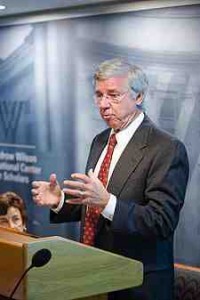 Earlier this week, Smart Growth America asked for stories about how high gas prices are affecting you, and we’ve already received an overwhelming response. Thank you to everyone who wrote in. If you haven’t told us about the kinds of tradeoffs you’re making to deal with high gas prices, click here to tell us your story.
Earlier this week, Smart Growth America asked for stories about how high gas prices are affecting you, and we’ve already received an overwhelming response. Thank you to everyone who wrote in. If you haven’t told us about the kinds of tradeoffs you’re making to deal with high gas prices, click here to tell us your story.
We heard from people who are saving money by choosing alternatives to driving, including walking, buses, light rail, subways and biking. We heard from people who wish they had more choices for ways to get around and from people living in rural areas where a car is the only option. People sent stories about delaying vacations, spending less on groceries, trading in a gas guzzler for something with better mileage, skipping doctors appointments that are across town, commuting 20 miles on a bike, and more.
There is no one-size-fits-all solution to this problem, but a consistent theme through these stories is that people who have shorter drives or transportation choices are not as directly affected by rising gas prices. Part of Smart Growth America’s work is helping great communities have more low cost options for getting around when gas prices get too high, but we need to hear from you to do it. Click here to tell us your story
Here are a few stories that you shared with us so far:
- Karen in Northern California says gas is $4.69 in her area, but she relies on walking and public transportation to get around. She said she decided to live in a place where she could get around without a car, but she said when she carpools with someone she is sure to chip in more gas money or buy them lunch.
- Matt moved to rural Ohio six years ago with his family and says gas is $4.00 a gallon and his last tank was $72.00. He and his spouse each spend two hours a day in their cars. He thinks they’ll spend $8,000 on gas this year. They have no other options and are miles away from everything: their daughter’s school, work, stores, etc. He says they’re thinking about moving back into the city, partially because of the expense of all that driving, and partially because they’re just tired of spending so much time in their cars.
- Christie lives outside of Nashville, Tennessee and says filling up her tank is $50.00. She takes the train and bus as much as possible, but she’s forgoing recommended medical treatments because the doctor’s office is too far away and it would cost too much to get there.
- JR in Hawaii sent in the highest gas price: $4.91 for a gallon. He said even with a hybrid car and minimizing his family’s driving, they’re still seeing first-hand effects of high gas prices because 70 percent of goods, including food, are shipped to Hawaii. JR says everything is getting more expensive.
How much does gas cost in your area? What are you doing to cope with the high prices of gas? If you don’t drive often, or at all, how do you get around? Smart Growth America wants to help more people have the option of shorter drives and more ways to get around. Click here to tell us your story.







